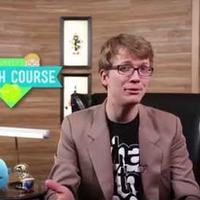06a. Locke, Berkeley, & Empiricism. Part 1/2.
Crash Course Philosophy is brought to you by Squarespace.
Squarespace: share your passion with the world. By the time we're done today, I just might have you questioning whether this apple is real or not.
Think I can't do it? Gimme about ten minutes! I might have you wondering whether I'm a physical object or not. And the same goes for all of this stuff, and your computer, and Nick behind the camera! And … you! How? By unleashing the power of empiricism. [Theme Music]
Last time, we learned about 17th century philosopher Rene Descartes, and how he upended the apple-basket that was his entire personal belief system, and descended into a radical skepticism, only to emerge with his conviction that: Cogito ergo sum – I think, therefore I am.
This one idea -- the fact that he was thinking -- or really, the fact that he was doubting -- allowed him to build back up, one by one, more beliefs that he thought he could rely on.
But in the end, most of the beliefs that Descartes ended up putting back into his intellectual apple-basket had to do with the immaterial world.
Like, he decided that he could believe that he existed, as a thinking thing. And he believed that God existed. Ultimately, he lit upon the idea that some of our thoughts are clear and distinct in a way that somehow guarantees their truth.
But, a lot of philosophers disagreed.
They argued that thinking on its own wasn't enough. Like, just because you're thinking, doesn't mean that your thoughts correspond to material reality in any reliable way. Basically, Descartes' philosophical opponents thought that the Cogito was a dead end. So here, we start to see a split between two different understandings of how we can most reliably get to the nature of reality, and therefore truth.
Both were responses to the constant questioning that is skepticism. On the one hand, there was rationalism. And on the other: empiricism. Descartes, like Plato long before him, was a lover of reason.
He met skepticism with rationalism. He believed that the most real things in life were ideas -- propositions that can be known through pure reason. Deductive truths, which we talked about before, fall into this category. And mathematical truths do, too. But by contrast, empiricism is based on the principle that the most reliable source of knowledge isn't our ideas, or our reasoning, but our senses.
Sure, we can know things through deduction and basic logic.
But what actually leads us to truth, or at least gives us our best shot at getting there, are things like induction, and the scientific method -- ways of thinking that tell us about the material world. Probably the most famous split among philosophers between these two camps was the life-long debate between Plato and Aristotle.
Plato was convinced that Truth resided in the immaterial world of Ideas, while Aristotle's attention was focused firmly on the ground. But what about in Descartes' day?
If he was the original prototype of the navel-gazing philosopher -- a living example of rationalist thinking — then his foil was the 17th century English thinker John Locke. This is where he was born. Locke believed that we're all born as a tabula rasa, or a blank slate.
He argued that all knowledge is obtained through experience. He rejected the concept of innate ideas -- the view that we're born pre-loaded with certain information, like what's good versus what's bad, or what is the nature of God. Locke thought that we are born knowing nothing.
And instead, all of our knowledge comes to us through sense data. But one place where Locke agreed with Descartes was in the idea that, just because your senses tell you something, that doesn't mean you can trust it. After all, sometimes your senses give you false information, like when you think you see or hear something that's just not there.
Descartes' response to this, of course, was to just throw out all sense experience as an unreliable source of knowledge.
But Locke didn't go that far.
Instead, in order to figure out whether the senses accurately reflect the outside world, he introduced a distinction between what he called the primary and secondary qualities of all things. Primary qualities are qualities that physical objects themselves have.
They're not in our minds, Locke argued -- they're actually in the stuff. These primary qualities include things like solidity -- the density, weight, and mass of an object. And also extension -- the height, depth, and width that a certain thing has. He also included figure, or the shape of an object, as well as mobility, which is this – whether it's stationary or in motion. So primary qualities, Locke said, belong to the thing itself.
Take this apple. It weighs maybe 150 grams, is the size of my palm, roundish, but firm, with the slightest bit of give, and right now it's moving through the air. Those are its primary qualities. But it has secondary qualities, too.
And by Locke's standards, they are not real. At least not in any objective, agreed-upon way. They're just in our minds. But they get there through the primary qualities. I'm talking about things like its color, taste, texture, smell, and sound. The secondary qualities of this apple are its redness, and how it tastes and smells and feels on my tongue and hand. Even how it sounds when I bite into it.

